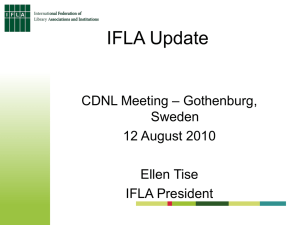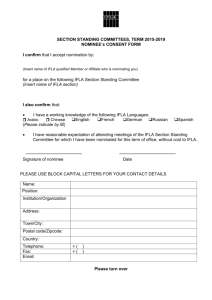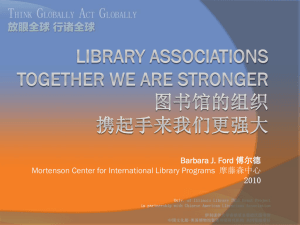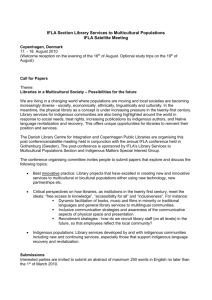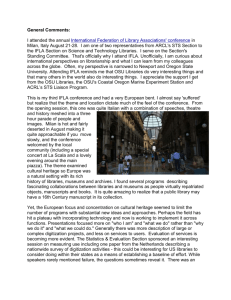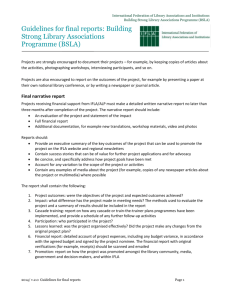2015 Nakuru Kenya
advertisement
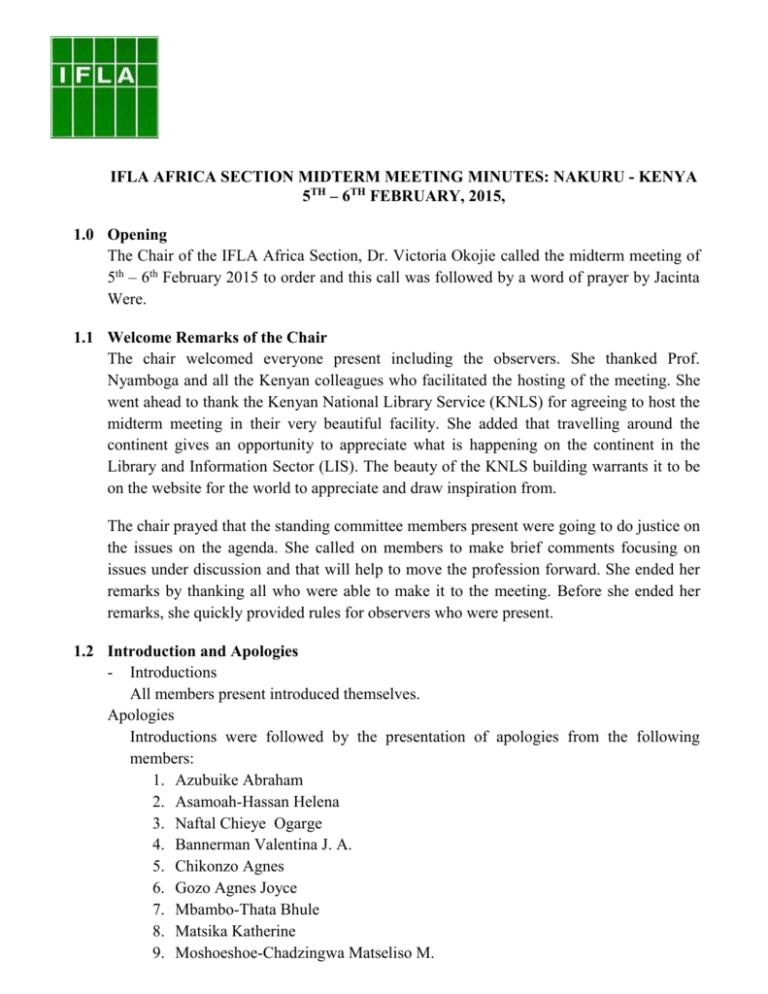
IFLA AFRICA SECTION MIDTERM MEETING MINUTES: NAKURU - KENYA 5TH – 6TH FEBRUARY, 2015, 1.0 Opening The Chair of the IFLA Africa Section, Dr. Victoria Okojie called the midterm meeting of 5th – 6th February 2015 to order and this call was followed by a word of prayer by Jacinta Were. 1.1 Welcome Remarks of the Chair The chair welcomed everyone present including the observers. She thanked Prof. Nyamboga and all the Kenyan colleagues who facilitated the hosting of the meeting. She went ahead to thank the Kenyan National Library Service (KNLS) for agreeing to host the midterm meeting in their very beautiful facility. She added that travelling around the continent gives an opportunity to appreciate what is happening on the continent in the Library and Information Sector (LIS). The beauty of the KNLS building warrants it to be on the website for the world to appreciate and draw inspiration from. The chair prayed that the standing committee members present were going to do justice on the issues on the agenda. She called on members to make brief comments focusing on issues under discussion and that will help to move the profession forward. She ended her remarks by thanking all who were able to make it to the meeting. Before she ended her remarks, she quickly provided rules for observers who were present. 1.2 Introduction and Apologies - Introductions All members present introduced themselves. Apologies Introductions were followed by the presentation of apologies from the following members: 1. Azubuike Abraham 2. Asamoah-Hassan Helena 3. Naftal Chieye Ogarge 4. Bannerman Valentina J. A. 5. Chikonzo Agnes 6. Gozo Agnes Joyce 7. Mbambo-Thata Bhule 8. Matsika Katherine 9. Moshoeshoe-Chadzingwa Matseliso M. 10. Nambila Ellen Ndeshi 11. Raseroka Kay 12. Yaw Kofi Christian Attendance S/No. Name (Surname First) Job Title Institute/Address/Country Email Present At the Meeting Librarians' Registration Council of Nigeria (LRCN), 4th Floor, Veterinary Council of Nigeria Building, ABUJA, FCT, Nigeria Monash University, South Africa Campus, Monash South Africa Library and Learning, Private Bag X60, Johannesburg Roodepoort 1725 Botswana Accountancy College, P/ Bag 00319, GABORONE, Botswana vicokojie@yahoo.com vicokojie@gmail.com Department of Library Services, Director, Client Services, University of South Africa, P.O Box 392 UNISA 0003 Pretoria, South Africa Box 551-50100 Kakanega Campus – Kakamega. lnhlapo@unisa.ac.za iflaafrica@ujnisa.ac.za University of Buea, PO Box 63 South West Region, Buea, Cameroon roshafack@gmail.com University Librarian Kenya jo_were@yahoo.com Archivist Kenya National Archives P.O. Box 2650 Nakuru Mount Kenya University naftachweye@yahoo.com 2. Naftal Chweye Ogarge Phelix Songok 3. 4. Purity Kavuri Emily Onchani Joseck Olala KNLS P.O Box 253, Nakuru, Kenya KNLS P.O Box 253-20100, Nakuru, Kenya KNLS P.O Box 253-20100, Nakuru, Kenya Purity.kavuri@knls.ac.ke Emily.mo.aa@knls.ac.ke 5. Librarian Senior Library Assistant ICT- Officer United Nations Dag Hammarskjold Library, New York 10017 USA Sub Director of the Library, National Assembly of Cameroon, Yaounde, Cameroon University of Education Winneba P. O. Box 25, WINNEBA, Ghana aazubuike@yahoo.com University of Zimbabwe Box MP45, Mount Pleasant, Harare, Zimbabwe Department of Library Services, Director, Client Services, University of South Africa, P.O Box 392 achikunzo@uzlib.uz.ac/zw 1. Okojie Victoria Registrar/CEO 2. Kotsokoane Nthabiseng Chief Librarian 3. Magocha Bongiwe 4. Nhlapo Lindi Head, Library Services IFLA Regional Office Manager for Africa 5. 6. Nyamboga Constantine M. Shafack Rosemary Director, Mt. Kenya University University Librarian 7. Were Jacinta nthabiseng.kotsokoane@monash .edu bongiwem@bac.ac.bw constantinebu@yahoo.com constantinenyamboga@gmail.com Observers 1. Campus Librarian psangok@mku.u Joseck.olala@knls.ac.ke Absent with Apology 1. Azubuike Abraham Chief of Access and Preservation Unit 2. Garga Alim (No VISA) Director of Library 3. Bannerman Valentina J. A. University Librarian 4. Chikonzo Agnes University Librarian 5. Gozo Agnes Joyce Department of Library Services, Director, Client a_garga@yahoo.fr valnin@yahoo.com; vbannerman@uew.edu.gh gozoaj@unisa.ac.za 6. 7. 8. 9. 10. 11. 12. Mbambo-Thata Bhule Matsika Katherine Services University Librarian UNISA 0003 Pretoria, South Africa UNISA, South Africa University Librarian National University of Science and Technology, Library, PO Box AC 940, Ascot, Bulawayo, Zimbabwe National University of Lesotho, P.O. ROMA 180, MASERU 180, Lesotho kmatsika@nust.ac.za enamhila@unam.na maadwoa2000@yahoo.com MoshoeshoeChadzingwa Matseliso M. Namhila Ellen Ndeshi University Librarian Raseroka Kay Yaw Kofi Christian Consultant Council member and Vice President of the Ghana Library Association University of Namibia, P/Bag 13301, Pioneeerspark, WINDHOEK 900, Namibia Botswana Council member and Vice President of the Ghana Library Association, Ghana Library Association, P.O. Box 4105, 4105 Accra, Ghana University Librarian KNUST, Kumasi, Ghana Asamoah-Hassan Helena University Librarian mbambotb@unisa.ac.za mamahlape@gmail.com hk.raseroka@gmail.com Cabodu14@yahoo.com; cykofi@gmail.com 1.3 Announcements The location of the rest rooms was indicated. The Kenyan Library Association (KLA) made the following announcements: - An annual conference that was to take place in November 2015 and before that there will be a conference in July. - An annual meeting in Sweden following a partnership between the KLA and Sweden that has been on for the past 3 years and will end in 2017. - Kenya will be celebrating 40 years of the KLA existence before May 2015, and their Library of the year programme with support from the Goethe Institute and Jomo Kenyatta University. Following the above announcements, some inspirations emanated from these that led to the following discussion from the Kenyan Library Association. For example, members agreed that it was a very good thing for libraries and associations to create partnerships that will provide for experience sharing and moving our LIS profession forward. It was agreed that this partnerships do not necessarily need to be only on a North-South basis but on a South-South basis. Thus members were encouraged to help promote collaboration between libraries and associations even if this was going to be on the basis of mentoring and advice. Some proposals made including pairing stronger associations with weaker ones that included: Kenya and Rwanda South Africa and Swaziland South Africa, Nigeria and Botswana, etc. It was proposed that someone be given the responsibility to draft a proposal on the partnership that will be discussed and adopted by those who will attend the WLIC in Cape Town. It was equally agreed that all Africans who will be at the WLIC in Cape Town will be drawn together for a discussion on this issue and others. Victoria Okojie took the responsibility to provide an information leaflet that will provide a guide on partnerships. Prof. Constantine Nyamboga was given the responsibility together with Kotsokoane Nthabiseng to provide written information on existing guides on partnerships around Africa to the Regional Office that will be used in producing the above named leaflet. 1.4 Adoption of the Agenda A 4.5 item on ICADLA was added to the agenda. Following this addition, the agenda was moved for adoption by Kotsokoane Nthabiseng. 2.0 Corrections and Adoption of Minutes of IFLA Africa Section Meetings I and II Held in Lyon, France 16th and 22nd August 2014. The above named minutes were appraised page by page with corrections made as members went through. After the corrections, the minutes were moved for adoption by kotsokoane Nthabiseng and supported by Magocha Bongiwe. 3.0 Matters Arising from the Minutes On matters arising, the following issues were raised: The joint open forum organized by the IFLA Section of Africa and Child and young adults was reported to have taken place very successfully with an impressive number of people in attendance. More than 90% of paper presenters were present and presented good papers. Members were informed that Martinex Philipe is now in charge of the Library and Information Section. With respect to nominations and election into the various sections of IFLA, all were encouraged to join the different IFLA sections and make contributions to their growth. IFLA WLIC Lyon-France was well attended by Africans and it was a very good outing and people are encouraged to attend more given that Africa is the host. On the leadership programme, SC members were informed that the first set of cohorts ended their term in August during the congress and were awarded certificates. Recently after the Governing Board Meeting, it was decided that this programme will continue. The non-execution of assignments given to members was frown upon. Nigeria and Kenya promised to submit their assignments on providing information on Library Schools by the end of the Mid Term meeting to the Regional Office Manager. The secretary was to keep reminding persons with assignments tirelessly until such assignments are done. 4.0 Reports 4.1 Chairs Report Deal All, I welcome you all most sincerely to Nakuru, Kenya. In particular, I would like to express profound gratitude to our host Professor Constantine Nyamboga for all the hard work to ensure that we all arrived safely and comfortable. I thank our corresponding member, an elder and former Chair of the Section, Jacinta Were for all her support and advice to ensure that the Section grows from strength to strength. My special thanks go to all colleagues and staff of the various libraries in Kenya for the very warm reception. I thank the National Library of Kenya for providing the venue for this meeting free of charge. An overview of the activities that the Section has been involved in since the last meeting is given below. 1. 2014 SC Meeting The Section held the second Standing Committee meeting as scheduled during the IFLA Conference in Lyon, August 2014. The minutes of the meeting are available here for the information and necessary action of members, especially those who could not participate in person. 2. BSLA Convening Immediately after the Mid-Term meeting in Kumasi, the Regional BSLA Workshop was held at the same venue. Participants comprising mostly Presidents of National Associations and other LIS leaders on the continent were at the workshop. A report of the workshop can be accessed on the IFLA website. 3. Roles and Responsibilities At the last Mid-Term meeting, it was decided that SC members should take specific responsibilities for the work of the Section. 4. Disaster Management (D M) The Section feels strongly about developing a robust DM Plan that will guide the actions of the African Librarians to prevent, and/or manage disaster. The National Library of South Africa (NLSA) currently has a training program and is taking the lead in this. We hope to get a report on how far it has gone at this meeting. 5. Finance The section received a total of €300s from IFLA HQ to manage its activities in 2014. This money was spent in producing the poster which was displayed during the IFLA Conference in Lyon. IFLA HQ continued its support to speakers at the Africa Section Open Forum in Lyon. A grant of €4000 was shared by the 4 speakers approved by the Africa Section as contribution towards their participation at the Conference. 6. Appreciation to SC Members The Section wishes to express profound appreciation to SC members whose tenures expire in 2015. We are particularly grateful to Alim Garga, Paul Diokh, Tseli Moshoeshoe and Victoria Okojie for the commitment and service to the Section. We wish them a higher level of quality service to IFLA. We hope that we can continue to count on their support. 7. 2015 IFLA WIC in Cape Town The next IFLA Conference will take place in Africa in 15-21 August 2015. I will like to use this opportunity to appeal passionately to all colleagues on the continent to attend the Conference. If we start our plans early, we can make it. 8. Conclusion Other issues that need to be brought to your attention are on the main agenda for this meeting Thank you all for listening. Following the Chair’s report, Jacinta Were thanked the chair and secretary for the work and on behalf of the corresponding members pledged their continuous support to the Section. 4.2 Regional Office Manager for Africa’s Report The regional office manager started her report with financial issues. She informed that, colleagues in the profession think that the regional office provides funds for paper presentation. They usually write to the Head Quarters to request for funding and usually, such requests are directed back to the regional office to see how to help. She informed that the office has no funds to support such request. She informed that Emerald always request for activities of the section that need funding. Based on this request, the Standing Committee, AfLIA and ICADLA activities were listed for which some funds have been provided. The manager informed that all SC members fund themselves to meetings and for midterm meetings, their meals are funded. She added that the regional office does not pay for the manager to attend meetings either. It has been the University of South Africa that has been sponsoring the regional manager’s bills. The ICADLA meeting was successfully chaired by the regional manager in 2014. The regional office participated in the Library and Information Association of South Africa (LIASA) Conference in Johannesburg in October 2014 The regional office hosted the Secretary General of IFLA, Jennifer Nicolson on the 21st of January 2015. The Secretary General during her visit, advised all volunteers to employ international English when communicating with Congress members. The office will be hosting the IFLA President who will be attending the Launching of the Library week by LIASA in Cape Town hopefully in March. The office will be organizing an annual public lecture on the theme “African Librarianship in the 21st Century”, on the 22 of May 2015 and John Tsebe will be the main speaker. The Regional office will be hosting the Satellite meeting from the 13th – 14th August in Cape Town for the African Section. The ICADLA meeting will hold back to back in Accra Ghana in May just before the AfLIA Conference and general assembly from the 26 – 30 May 2015. The manager informed that Library Associations are quite active thanks to the Building Strong Library Association (BSLA) Programme. The office facilitated the organization of a workshop on preservation and conservation for Anglophone Africa with assistance from the National Library of South Africa. The regional office is constantly involved in the BLSA programmes. The recent African beneficiaries include Zambia, Zimbabwe, Uganda, etc. There has been no project submitted from Central Africa, Kenya, Nigeria, Ghana, etc. Following the manager’s report, the office was assigned to produce a draft directory for national associations. 4.3 Information Coordinator Katty Matsika was designated the Information Coordinator for the Africa Section but because of ill health following a car accident, she has not been able to take up this duty. Kotsokoane Nthabiseng has been doing this work graciously. Nthabiseng is also helping Joyce Gozo in the IT work and the section remains very grateful for her sacrifices and support. She is currently helping with fixing the IFLA website that has got lots of gaps. The next issue of the newsletter is on course but there is need for articles and country reports. Country reports can be gotten from minutes. Nthabiseng proposed a health page on the website and for minutes to go to the repository as far back as possible as well as the SC list for elders. Magocha Bongiwe offered her services to help Nthabiseng to do the newsletter and other information issues. Constantine Nyamboga offered to read or edit the newsletter and other documents. On behalf of the Standing Committee, the chair thanked all these colleagues for their support and added that these three colleagues will constitute the committee for Information Coordination. 4.4 ATINA SIG Members were informed that the convener of ATINA SIG, Abraham Azuibuke sent an apology for not being able to attend but added that there will be an ATINA Conference in Cape Town, South Africa during the IFLA World Library Congress (WLIC) in 2015. 4.5 ICADLA The regional manager for the Africa Section’s report captured the ICADLA activities 5.0 Africa Library Network/Association Updates 5.1 African Public Library Network (APLN) Members were reminded that Getrude Moliwindwe is the coordinator of this network and a few countries have registered their public libraries on the network. It was agreed that it was necessary for Getrude to revive this network and put online. For now the Kenyan National Library is hosting the APLN website. There are funds available under the Gate Foundation for the Public Library Sector for training in Africa under the International Advocacy Programme. The APLN needs to be strengthened in order to benefit from these funds. The chair promised to write to Getrude on this issue. 5.2 National Library in Africa A directory of National Libraries of Africa has already been developed and is on the website. John Isebe was instrumental on this. The Regional Manager will do a demo of this directory before the end of the Mid Term meeting. 5.3 Africa Library Associations and Institutions (AfLIA) AfLIA will be organizing a conference and a 3rd summit from May 30 – 2 June 2015 in Accra, Ghana. There will be elections for the various sections of AfLIA and only persons present will be elected. The Executive Director, Helena Assamoah-Hassan, the President, John Isebe and the IFLA Chair Africa Section are inviting all to be present. 6.0 IFLA World Library and Information Congress (WLIC) 2015, Cape Town, South Africa 6.1 Updates Deputy Ministers to whom libraries report will hold a satellite meeting to chat a way forward IFLA Secretary General, Jennifer Nicolson was in South Africa to meet with the organizing committee and the Deputy Minister of Arts and Culture to ensure that all arrangements are on course. The Regional Manager was called upon to seize any opportunity to talk to the Deputy Minister of Arts and Culture of South Africa about issues of VISAs. 6.2 Poster Session The theme for the Africa Section Poster for the IFLA WLIC 2015 is, “Access to Information and Development”. 6.3 Open Forum The IFLA Sections for Africa and Parliament will be organizing a joint forum on the theme, “Access to Legal Information and Legislative Data in Africa: The Role of Libraries and Librarians”. 6.4 a) Satellite Meeting 2015 The IFLA Africa Section will organize a Satellite meeting on the theme, “The United Nations Post 2015 Development Agenda”. This satellite conference will be hosted by the Cape Town University of Technology (CTUT). The call for papers will be extended to March and abstracts will be sent to SC members to grade. It was agreed that a key note speaker will be gotten from the AAU Headquarters in Ethiopia (through Irene and Gamma) Equally the chair will contact Buhle Mbambo-Thata and Stuarts H. to see if the speaker for the women’s conference in Pretoria on the same theme as that for the conference can be the key note speaker. Lindi Nhlapo was assigned to contact Puleng of the UN office and Nboya of NEPAD as speakers at the satellite conference. 6.4 b) 2016 Satellite Meeting, Washington D. C The chair of Africa section got a mail from the Library of Congress by Marte Penn inquiring to know if the IFLA Africa section will like to have a satellite meeting as part of the WLIC 2016 activities. She had gone ahead to book the Africa section for a satellite meeting. She informed that the Library of Congress will provide space, help in organizing meeting and tours as well as transport that the section will pay. The SC members appreciated this action of Penn a lot and committed the section for this pre-conference satellite meeting in Washington D. C. A proposal is for the theme of the satellite meeting to focus on African Americans and their roots. It was agreed that John Isebe and Kay Raseroka will be contacted to propose a theme and secondly that an invitation to this meeting will be addressed to the Black Caucus in the US. 6.5 Africa Caucus Africa caucus helps to support colleagues who want to join IFLA Sections. The need to inform Library Associations to sensitize their members to join the IFLA sections w3as highlighted. Everyone has an opportunity to join any section of their choice. It was agreed that during the IFLA WLIC in Cape Town, Africans attending the congress will be pulled together to discuss issues affecting the LIS Sector on the continent. 6.6 Africa Section Support to Attend IFLA WLIC 2015 This proposal was thrown to the floor for discussion. After intense discussions, the following resolution was made: Those weak or young Library associations will be encouraged by providing financial support to a member each to attend the IFLA WLIC Congress of 2015. The objective is to enable such a person to gain experience from the richness of the congress and share such with association members on return. This will be a motivation to that association to get involved with IFLA convening and this will equally constitute the IFLA Africa section’s way of supporting the IFLA Building Strong Library Programme (BSLA). The funding was going to be partial in the hope that the association will take care of the rest of the costs. It was agreed that a grant of €1000 per person will be given. The procedure will be to write to the associations informing that there is an amount of €1000 available to support one person to attend the congress from each association in question through a call for applications. These will be weak or young associations that the section needs to mentor to enable them go stronger. Five associations in five countries will be identified. 7.0 IFLA Head Quarters (HQ) 7.1 IFLA Governing Board/Division V Update The IFLA HQ sends greetings. The Governing Board (GB) had a meeting in December and some of the outcomes of the meeting include: - The birth of the International Advocacy Programme. - The decision to continue with the IFLA Leadership Programme as from 2016 The election process of GB members is ongoing and Africa has a request from Ellen Namhila for support for election into a second term. Division V has a caucus meeting during the WLIC in Cape Town. 7.2 IFLA Awards Members were informed that with respect to IFLA Awards, it is the National Association that nominates, and then the section supports. The Kenyan Library Association was called upon to nominate again and the section will support the nomination. 7.3 IFLA Strategic Plan and Key Initiatives All members of the section were called upon to visit the IFLA website, download the IFLA Strategic Plan and key initiatives, read and acquaint themselves with these. It was very important for every member to be acquainted with these. The chair was to sensitize members on this. 7.4 Building Strong Library Association Update Issues relating to the above were already handled in the regional manager’s report. 7.5 ALP Updates ALP has been supporting the BLSA Programme. 7.6 IFLA International Advocacy Programme A two and the half hours working session held to discuss the IFLA International Advocacy Programme on day two of the IFLA Africa section Mid Term meeting. This discussion was led by the IFLA Africa Section Chair, Victoria Okojie. What is the IFLA International Advocacy Programme (IAP)? It is a programme aimed to achieve policy change at national, regional and international levels by building capacity across IFLA and Library communities to access policy needs, create policy recommendations and advocate for policy frameworks that support public access to digital information through public libraries. After understanding what the IAP is all about, SC members who had been given a two page document on IAP to read the previous day were given the floor to raise any issue before the start of discussions. Members took the floor and raised the following issues: - Members inquired to know how countries that will participate in the IAP programme will be selected. - Members raised issues that needed to be clarified such as: What IFLA will not do with respect to this programme (see paragraph 2 pages 3 of the working document presented by the chair) Need to clarify point on paragraph 3 on page 5 given that before the IAP programme; there have been IFLA Advocacy programmes. Thus there is need to make this point clearer. That there could be need to link the IAP programme to the BSLA so that trainers could tap on new experience. That lessons learnt from the BSLA programme can be used to improve on the IAP programme for example a. The IAP should be in form of TOT b. Should be interactive c. Get expert to brainstorm and come up with models and pilot test before use. Following the above issues raised, discussions on the IAP document proper began. SC members went through the working document guided by the chair systematically. At the end the following feedback were provided. Feedback on IAP Discussion Questions 1) What are the key Access to Information issues in your country / region and why on the above question, SC members provided the following feedback. The implementation of existing policies faces challenges. Licensing issues is a key problem in Africa. In Africa, generally, access to E-Texts is an issue. There are problems of connectivity as a result of costs. There are copyright problem, in some countries the copy right law is nonexistent. E-lending is quite difficult as a result of several challenges - The above issues were said to be broader issues not only relating to the library profession. It is not evident in most parts of Africa that library associations or libraries are actively working to influence the issues in question. There are many organizations besides libraries that are working on issues in question. An example is the E-kitabu in Kenya. It is possible to actually make changes on this issue. For example, partnering with local publishers to place their publications online. Consortia building, building networks with different types of libraries, format consultations with policy makers using parliamentary libraries to influence policies, etc. On existing policy statements, legislation or documents, SC members were requested to E-mail what exist in their different countries to Fiona Bradley and copy Victoria Okojie. - - 2) How are Libraries influencing public policy in your country / region? What are some of the challenges in doing this work? On the above question there was a common answer which was that, the strengthening of the voice of the profession and building partnerships was helping the libraries to influence public policy. The main challenges to this raised included, the existence of bureaucracy and problems in implementing existing policies. 3) If you were to choose one of the issues you identified at the start of this discussion and aim to influence policy around it, how would you do it? - On getting consensus, SC members said it is possible to do this via national conferences by library associations, continental bodies such as AfLIA and AAU for Africa, through seminars, list serves, etc. - The key organizations to work with are; Library associations, consortia, etc. - Working with other organizations UN through consultations and partnerships. - SC members all agreed that coalition was a very familiar concept. - Members said they would develop a policy strategy by speaking with stakeholders and then create committees to discuss views and come up with a policy. - Influencing policy for digital access to information was generally considered to be a realistic possibility. On scoping, the following countries were sampled: Kenya - It has a strong consortium - It has a Library Association that has never dropped - It has a strong national library network that is very strong and the voice of the libraries is so strong. - Most public libraries in Kenya are connected to the internet using the tax payers’ money. - The National Library of Kenya influences national policies. South Africa - South Africa has the ICT infrastructure - South Africa has got experienced librarians that can drive the IAP programme. - South Africa has a very strong support from the library association. Botswana Most public libraries have been cabled and are only awaiting content. - The national library of Botswana can drive this programme. Cameroon - The IAP programme will come to further sustain the BSLA programme. - The structural adjustment plan of the World Bank that equally lays emphasis on library development is already raising great awareness for successful implementation of any programme relating to the library sector. - The government policy on achieving the MDGs is a catalyst to supporting the library sector. - The National Library Association and Ministry of Culture of Cameroon are able to drive this programme. Nigeria - This country has a very strong library association to drive this programme. - The existing project with Beyond Access in this country provides fertile grounds for the implementation of this project. - Nigeria has good government support for the library sector. - Nigeria has a good public Library Network and needs to be improved upon. The working session ended with each member asked to do the exercise on “five whys” in 30 minutes. This was done and handed to the chair. The chair then informed that she will send specific questions to SC members to respond to in order to help complete the report on IAP to be sent to Fiona. 8.0 IFLA Elections 8.1 Governing Board / President Elect. Ellen Namhila who is a member of the IFLA Africa section has been nominated for election into a second term. IFLA Africa SC members are called upon to vote for her. They should each sensitize qualified members of IFLA in their countries to vote for her. She is the only African candidate. There is a colleague who participated in the IFLA Leadership programme in the person of Margaret Allen who has requested the Africa Section to support her candidature for the Governing Board. She is from Division V. We call on members to support her as much as possible. With respect to the President–elect, Egypt is putting in a candidature in the person of Serageldine, one with a very high profile. 8.2 Standing Committee of IFLA SC members were called upon to sensitize professionals in their different countries to put in their candidature for as many IFLA committees as possible or sections. 8.2.1 The chair at this juncture appreciated all outgoing members of the IFLA Africa section for their support and contributions to the work of the section. 9.0 Africa Section Strategic Plans The IFLA Africa Strategic Plan was evaluated with major focus on the goals, outcomes, and actions and how far these have been achieved. This was done systematically from Goal one to the last as follows: Goal 1: To promote and support the development of the profession in the region through strengthening of Library Associations This is ongoing with a lot of success stories registered. The BSLAs in particular speaks to this achievement. Recently Botswana, Zimbabwe and Zambia benefited from the BSLA project. On 1.1.2, AfLIA has been born. Action 1.1.3 and 1.1.4 was added to Goal 1 which read: - 1.1.3. Compile a directory of National Library Associations in Africa. - 1.1.4. Establish South cooperation on the continent. Goal 2: To promote and support development programmes that focus on improved information use, reading and literacies in Africa. It was agreed that goal 2 is being executed generally. Some examples for 2.1 include; Nigeria with book fairs and book Trust, in Cameroon book fair and workshops, reading tents in Kenya and Ghana, etc. With respect to 2.2. we have the E-Kitabu Microsoft IT academy in Kenya for public libraries which is free. On 2.3. national associations are creating awareness on the role of libraries and promoting literacy and lifelong learning. For example, Botswana is training first year university students. Nigerian Registration Council is training on electron skills. Goal 3. To promote the role of libraries in the information society It was agreed that this is on course because libraries exist on the continent and their main role is linked to goal 3. There are several advisory services aimed at improving public libraries on the continent for example. With respect to outcome of Goal 3, it was changed and a new outcome articulated. The outcome reads as follows: Outcome: Support LIS Events and Initiatives Action 3.1 is on course and billed for 30 May to June 2015 in Ghana. Action 3.2 is on course still in Ghana and on the same date as 3.1. Action 3.3 has advisory services now provided to take care of this. Goal 4. To drive access to content and digital resources for Library users Action 4.1 is on course with an International Conference on Africa Digital Libraries and Archives (ICADLA-4) being organized in Ghana from 26 May 2015. Action 4.2 is on course. For example: - South Africa organizes every year an Open Access week, - University of Yaounde I in 2014 organized an Open Access week, - Kenya does this on a routine basis every year. - Botswana has its consortium that has annual activities on Open Access. Action 4.3 is on course. Libraries are working with partners on this. A regional workshop on preservation and conservation was recently organized in February from 2nd to 3rd in Kenya just before that Mid Term meeting. Cameroon has just completed creating digital photo archives in the Buea National Archives Annex. Action 4.4 is on course with Helena Assamoah-Hassan as coordinator for Africa. Action 4.5 was moved to become action 6.2 and new actions, 4.5 and 4.6 were articulated to read: 4.5: Participate in the IFLA International Advocacy Programme. 4.6: Contribute to the Development of Guidelines for digital preservation of indigenous knowledge in Africa. Goal 5: To promote education and for continuing professional development for the Library and Information Profession in Africa. Action 5.1 It was agreed generally that there is need to review curricula at national and regional levels. It was equally confirmed that efforts are on course in some countries presently on revision of curriculum. For example, Nigeria is reviewing, Botswana has reviewed but the main challenge has to do with capacity to deliver the new content. There was need to seek a solution to this challenge. There is the ongoing Carnegie cooperation fund for a regional project on developing and running a course on building capacity of librarians in South Africa, Uganda, Nigeria, Ghana and Tanzania. Action 5.3 is on course and a draft directory of schools will be out by April and a final copy in June. Action 5.4 in relation to action 5.3 on inputting information on Africa into the IFLA World Report and creating a link between the sections web page and the report, all SC members were requested to actively go to the IFLA website and update information on the World Report pertaining to Action 5.5 on encouraging the organization of at least one continuing professional development programme at the national level for LIS professionals. Members informed that this is ongoing. Examples included Nigeria that organizes at least 20 professional development programmes a year and South Africa that develops Webinars for its LIS professionals. Action 5.6 on capacity building, it was informed that this was on going with online platforms in South Africa and Kenya for improving the capacities of LIS professionals. A new action for goal 5 was induced as action 5.2 thus with goal 5.2, 5.4, 5.5, becoming, 5.3, 5.4, 5.5 and 5.6 respectively. The new action 5.2 read thus: Action 5.2: Building capacity to implement the revised curriculum. Goal 6: To promote documentation and preservation of indigenous knowledge and to advocate for moral rights, intellectual property and copy right for indigenous knowledge. On this goal, it was agreed that there were activities going on in the continent relating to this goal. Dr. Kay Raseroka’s project on IKs was cited and SC members were reminded that she had been requested to take the lead on this as an expert in the area. Action 6.1. This is still to be implemented. Action 4.5 was moved to become action 6.2 and reads as follows: - To build capacity on the continent on digital preservation of indigenous knowledge and develop guidelines for digital preservation of IKs. Goal 7: To support the IFLA Presidential Theme: Action 7.1. on circulating information about the presidential theme had the following feedbacks. This was ongoing and for the current presidential theme, a symposium was organized in Namibia last year with the proceedings to be published by the Namibia Library and Information Association. On action 7.2 to organize satellite meetings on presidential theme, this has been on course especially in late 2013 and in 2014 with contributions to the Trend Report and the Lyon Declaration. Goal 8: To advocate for improve access to information and knowledge for development in Africa. This has been ongoing reflected in all the efforts put in by library associations and individual libraries in different countries. 10.0 IFLA WLIC 2015 Review of Abstracts for the Open Forum The call for papers came out late and the deadline for receiving abstracts was extended to March. Abstracts will be reviewed later. 11.0 IFLA WLIC 2015 Review of Abstracts for Africa Section Satellite Meeting The deadline for receiving abstracts was built for a date after the Mid Term meeting. Thus the abstracts could not be reviewed during the Mid Term meeting. 12.0 Any Other Business 12.1 Criteria for Hosting First Phase Identify a venue in your area, availability and cost Identify the accommodation and cost The ideal would be to identify any other LIS activities (workshops, conference, etc) around your area during the time intended for the midterm meeting Check all travelling modes, schedules and cost Identify any possible sponsor Prepare a project proposal to host and send it to the chair. The project proposal should include the budget. Second Phase Prepare a draft of the invitation letter for visa purposes (this letter should be in the language of the host country and should be addressed to the person invited, possibly with a copy to the consulate or the embassy in the invited person’s country) Prepare a brief on travelling requirements to the area Send out invitation letters to the participants All invitations must be sent out six months before the meeting To give some visibility to the SC meeting in the country and to IFLA as a whole, the host should submit to the SC chair the names of the local people wished to be invited for the meeting. Financial Issues Each SC member is responsible to fund travel, visa and accommodation. IFLA HQ provides support by providing meeting attendance funds. It is a tradition that partial funding is afforded by the host (tours, dinner) The overall budget should specify the following elements: - Cost of venue for the meeting - Accommodation - Shuttle (for airport and local travel) - Catering. Roles Chair/Treasurer is responsible for - Working in partnership with the secretary - in preparing for the meeting - in preparing the invitation letter to SC members - after the meeting, to report to IFLA HQ - Working with the RM to oversee meeting funds from IFLA HQ Secretary is responsible for: - Minutes - Agenda - Preparation of the Open Forum documentation - Table of abstracts and abstracts received. Regional Manager is responsible for: - Overall support to the Chair, Secretary and host - Funds from IFLA HQ - Receive funds from IFLA HQ - Payment of the meeting venue - Payment of shuttle - Payment of catering - Payment of administrative funds (copiers…etc) - Ascertain that the chair and secretary travel accommodation is paid for, only the midterm meeting not WLIC - Compile the financial report with supporting documents for HQ, copy the chair. Host is responsible for - Assist in travel logistics - Confirm booking of accommodation and meeting venue - Assist with administration related to the midterm meeting - Create a pack of all documents related to the meeting per member - Coordinating, catering for the meeting. 12.2 Structure of Satellite Meeting in Cape Town, South Africa – 2015 and Potential Speakers Date of Meeting: 13 – 14 August 2015 Host Institution: Cape Peninsular University of Technology Day One: 13 August 2015 8:00 – 9:30: Registration 9:30: - Opening and Introductions - Key Note: UN Post Development Agenda 10:40: Coffee Break 11:00: Paper Presentations 13:00: Lunch 14:00: Recommendations in Round Table or Panel Discussions 16:00: Tea Break Day Two: 14 August 2015 8:00: Registration Continues 9:00: Panel Discussions Continues 10:40: Tea Break 13:00: Closing 13:30: Lunch and Departure Potential Speakers for the Satellite Meeting included the following proposals - Buhle Mbambo-Thata Helena Assamoah – Hassan (Victoria ) Justine Chisenga (Prof. Nyamboga) John Tsebe (Lindi) Prof. Mutula Stephen (Bongiwe) Politicians from NEPAD and UN (Buhle) Kplanaat Joseph (Prof. Nyamboga) The secretary was requested to draft a letter for the identified speakers. The secretary together with Mbogiwe will be secretaries during the Satellite meeting. 13.0 Next IFLA Africa Section Standing Committee Mid Term Meeting It was agreed that the next meeting will take place in Botswana in 2016. 14.0 Closing and Adjournment The chair expressed once small her gratitude to Prof. Nyamboga for assisting in the hosting of the meeting and making all the arrangements. She thanked the Kenyan National Library Service (KNLS) for hosting the meeting in their beautiful facility. She expressed gratitude for all the receptions (dinner) that the Director of KNLS and his deputy, the caterers, drivers, friendly staff, observers, photographers, Jacinta Were for always being there for the section and finally the SC members for all the sacrifices and support to the section. She hoped to see everyone in AfLIA Ghana and WLIC Cape Town. She wished everyone a safe trip back home. After these closing remarks, the meeting was adjourned. Dr. Victorial Okojie Dr. Rosemary M. Shafack Chairperson, IFLA Africa Section Email: vicokojie@yahoo.com Tel: +234-803-8817 Secretary,IFLA Africa Section Email: roshafack@gmail.com Tel: (+237) 699-698-868
